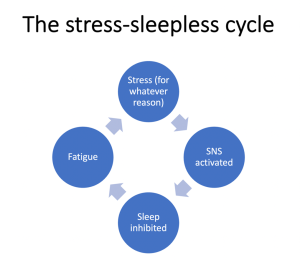
If there is one question I can guarantee will come up every single week on my Q&A, it’s a question along the lines of whether a baby/child can become overtired. Sometimes there’s an assumption in the question – such as presuming that if a child skips a nap or is late for bed that this will have more long-term consequences on sleep patterns or behaviours.
There is so much confusion with ‘overtiredness’. I don’t think I’ve always done a great job of explaining it, partly because I have presumed that people understand the broader contexts and factors that influence the stress response. But over the last 3-4 years I’ve got better at understanding where people get confused so that I can explain it better. Let’s dive in…
Let me paint you a picture of a scene…
Max is a 9-month-old baby who is reported to ‘fight sleep and get overtired’. When bedtime is initiated at 8pm, he appears ‘wired’ and upset, and finds it hard to fall asleep even though to his parents he is clearly in need of sleep.
First of all, you can’t ever be too tired to sleep. But I can practically feel hackles and eyebrows rising so let me follow that up immediately with – you CAN be too dysregulated to sleep.
To properly explain this, you’ll need to bear with me while I remind those of you who don’t know, two key aspects of biology that inform this viewpoint:
- Sleep is regulated by the circadian rhythm, and homeostatic sleep pressure. The two processes are separate, but they interact and work in parallel to some extent. As you spend time awake, your sleep pressure builds – the chemical adenosine increases in concentration which eventually makes sleep inevitable. The sleep pressure only goes away during sleep. So the longer you are awake, the more sleep pressure (adenosine) will build.
- Sleep exists in the parasympathetic nervous system state. Your autonomic nervous system can be thought of as having two divisions – the sympathetic (fight, flight, or alertness) and parasympathetic (rest and digest, aka sleep)
If we think about the first part then, it’s not sensible that you could ever be so tired you couldn’t sleep. It’s not the way your body works. The longer you’re awake, the higher the sleep pressure. Have you ever been so tired you could barely keep your eyes open? When we flew back from Florida last month our circadian rhythms took some time to adjust, so in the meantime, when we landed at 7am in London, it felt like 2am in Florida. We pulled ourselves together, drank coffee (a central nervous system stimulant which blocks adenosine) and powered through. But those eyelids didn’t want to cooperate, and the caffeine effect wore off quickly. Similarly, if a child is late for bed, their sleep pressure (adenosine) hasn’t gone anywhere – therefore the sleep pressure is still very much present. It is simply not true that a child could be so ‘overtired’ that they cannot sleep, if by overtired, people mean they have too much fatigue.
This leads me to my second aspect of sleep biology: the stress response. The sympathetic nervous system isn’t just about running away from danger. The reason I often talk about the sympathetic nervous system as being like a ‘gas pedal’ is that it helps people to understand that the gas pedal isn’t just used to go from 0-60mph in an emergency get-out-of-danger scenario. The gas pedal is also used to gently creep safely out of your driveway. Returning to being human rather than cars now, this means that if you’re awake, active, alert, listening and focusing, your gas pedal is down a little (not a lot, but a little). This is sympathetic nervous system activation. If you’re reading this newsletter, your gas pedal is down. Thinking about little ones, if they are busy playing, or interacting with you, they are concentrating. Their gas pedal is down. You get the picture.
Now, the thing is, sleep does not occur while the sympathetic nervous system is activated. It doesn’t make physiological sense if you think about it. The body can either be ready for action and alert, or it can power down and relax. It can’t do two things at once. You can see how I’m slowly coming round to sleep now I hope! If a child’s gas pedal is down for any reason – whether they are alert and focusing calmly on a toy, laughing joyfully while you play peekaboo, getting squirmy because they’re hungry, or screaming their head off for whatever reason – their sympathetic nervous system is activated to some extent.
There are obviously degrees to which the gas pedal can be pushed down – they could be alert, communicating and ready to learn, getting fussy, or having a full-blown meltdown. Obviously, those states are all different and will require a different approach in terms of parental response but the bottom line is that none of these states are compatible with sleep.
So let’s get back to the scenario where Max has maybe missed his nap, or been woken earlier than usual, or is late to bed. The upshot is that this little guy has really high sleep pressure. He’s cranky and falling apart and then becomes hard to put to bed. It’s a real head-scratcher, until you realise that Max isn’t struggling to fall asleep because he’s too tired. He’s struggling to fall asleep because he’s upset.
It might sound like I’m splitting hairs, but the excessive tiredness isn’t preventing sleep. The crankiness is. Max’s gas pedal is down which means sleep isn’t happening.
Let me share a diagram which might help:

We all have different sleep needs. Some of us have higher or lower sleep needs than others. Some of us have really good compensatory mechanisms when we don’t get much sleep and are able to deal with being more tired than usual fairly well. Others of us kind of fall apart! Being tired can make some people feel really rattled. You know yourself after a bad night’s sleep, or jet lag, or a night shift, you sometimes feel cranky, irritable and snappy. Little ones have this same variability. Some of them tolerate rising sleep pressure well, and just fall asleep more quickly. Others get upset.
Guess which kids end up finding it harder to fall asleep? Ironically, the ones who probably have higher sleep needs! So if your child (or the child you’re supporting professionally) appears ‘wired’, ‘rattled’ or falls apart, what is happening physiologically is that the level of fatigue causes sympathetic nervous system (SNS) activation. It is the stress, not the fatigue that inhibits sleep. But the kicker is that even though the cause of the stress response is the fatigue, the child will find it hard to fall asleep due to their gas pedal being pressed down. So they get more fatigued.
Many people try really hard to get a little one to go to sleep in this state, knowing that this is what they need. But that’s unlikely to work because they’re rattled. You need to focus on calming them down and getting that foot off the gas pedal. Once they’re calmer, don’t forget, in the background, their sleep pressure is still high – so they will fall asleep.
Once that child is asleep, adenosine levels start falling, so they don’t remain in a state of stress which will affect sleep all night long or cause early rising. Anecdotally, some little ones wake more frequently in the evening, but this is usually just for the first couple of hours of their nighttime sleep.
One more thing then – being excessively tired isn’t the only reason little ones might be rattled or upset. Don’t forget that (just like us!) little people are sometimes learning new things, living through uncertainty, dealing with changes at home, and they are aware of stresses and tensions in the household as well. These are all other reasons why sometimes little ones don’t find it easy to relax and stay relaxed. Unfortunately, this kind of stress response can be easily confused with the overtiredness obsession and being tired can be blamed for a really unsettled night. As I often say, if tiredness isn’t the problem, sleep isn’t the answer. So if your little one is rattled by something other than fatigue, that may be the other reason why they are ‘fighting’ sleep. No amount of prolonging naps or early bedtimes will work for this.
This is why I have virtually removed the word ‘overtired’ from my vocabulary in the last 3-4 years. It is too easily confused with dysregulation and stress. But the good news is that no matter what the underlying cause of a child being stressed is, if you focus on getting their foot off the gas, when they’re ready – sleep will come.
Check out my books Let’s talk about your new family’s sleep and Still Awake for more accessible and sensible sleep information, and my 0-18 and 18-36 month sleep guides for easy to read and implementable tips and reassurance.

Leave A Comment
You must be logged in to post a comment.